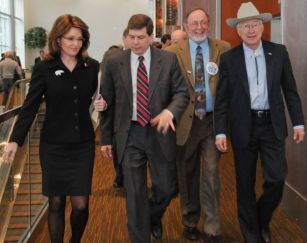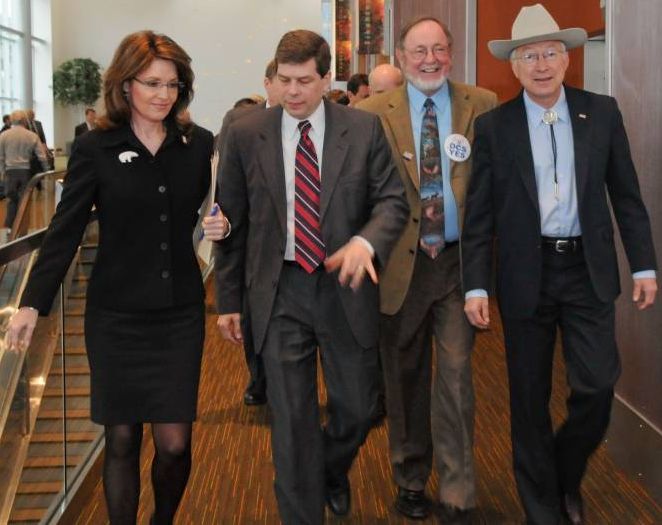 Alaska Gov. Sarah Palin (from left), Senator Mark Begich, Congressman Don Young and Secretary of the Interior Ken Salazar arrive at a public forum meeting in Anchorage Tuesday to discuss Outer Continental Shelf development.Courtesy Alaska governor’s officeSarah Palin seems to have discovered global warming, and she’s got just the thing to do about it.
Alaska Gov. Sarah Palin (from left), Senator Mark Begich, Congressman Don Young and Secretary of the Interior Ken Salazar arrive at a public forum meeting in Anchorage Tuesday to discuss Outer Continental Shelf development.Courtesy Alaska governor’s officeSarah Palin seems to have discovered global warming, and she’s got just the thing to do about it.
Yesterday the Alaska governor said climate change is harming her state, but she insisted that expanding natural gas production is the best way to lessen the effects of global warming. She was speaking at an Anchorage hearing held by Interior Secretary Ken Salazar, who is holding several such meetings around the country to consider renewing oil and gas leases on the outer continental shelf.
“We Alaskans are living with the changes that you are observing in Washington,” the Republican governor said. “The dramatic decreases in the extent of summer sea ice, increased coastal erosion, melting of permafrost, decrease in alpine glaciers and overall ecosystem changes are very real to us.”
She promoted Alaska’s vast natural gas reserves as a cleaner alternative to oil and coal and a realistic “transition” energy source while the country shifts to a low-carbon energy system.
“There is no way to achieve these goals in the next few decades without a dramatic increase in domestic natural gas and a strong effort to modestly increase domestic oil production,” she said. “Keeping Alaska’s OCS [outer continental shelf] lease sales, exploration, and development programs on schedule, especially in the Beaufort Sea and Chukchi Sea, is critically important to this effort.
She wasn’t so much abandoning the “drill, baby, drill” mantra that came to define the McCain-Palin energy strategy in last fall’s election as she was offering a new rationale for it — cutting greenhouse gas emissions. Palin stopped just short of explicitly saying she believes humans are causing changes to the climate.
“She didn’t say that directly. I think it’s implied … That was a significant step for her,” said Kate Troll, executive director of Alaska Conservation Voters.
Cindy Shogan, executive director of the Alaska Wilderness League, thought it was less significant.
“I don’t know if this signals an official change in her thinking,” she said. “But she is a pretty savvy politician and ‘maverick,’ and I think she sees the writing on the wall that there’s going to be some legislation and some administrative action on climate change, that this is something she’s going to need to address.”
In her comments [PDF] on Tuesday, Palin linked the desire of “many” to cut greenhouse gas emissions with the natural gas pipeline she has long hoped to build in her state.
“Many believe that in order to mitigate these long term and systematic changes it will require a national and global effort to decrease the release of human produced greenhouse gases into the atmosphere,” she said. “However, simply waiting for low carbon emitting renewable capacity to be large enough will mean that it will be too late to meet the mitigation goals for reducing CO2 that will be required under most credible climate change models …
“Meeting these goals will require a dramatic increase, in the very near term, to preferred available fuels – including natural gas – that have a very low carbon footprint and that can be used within the existing energy infrastructure. These available fuels are required to supply the nation’s energy needs during the transition to green energy alternatives.”
The statement marks a shift from her position on the campaign trail last August, when she told the conservative magazine Newsmax: “A changing environment will affect Alaska more than any other state, because of our location. I’m not one though who would attribute it to being man-made.”
Palin’s office did not immediately return requests for comment on whether the statements signaled a change in the governor’s thinking. She continued to advocate for a natural gas pipeline connecting Alaska’s reserves with the lower 48 states, for continued investment in the state’s established gas developments, and for access to gas reserves in the Beaufort and Chuchki seas off Alaska’s northern coast. (The Anchorage Daily News has a good map of the state’s reserves.)
Troll said her conservation group supports the pipeline and the state’s current natural gas developments but opposes development in the fragile ecosystem of the Chuchki Sea. She said she approved of Palin proposing natural gas, a low-carbon fossil fuel alternative to coal and oil, as a temporary energy source on the road to a greener-energy economy.
“We have a lot of known reserves, and it could be an ideal bridge fuel for America,” Troll said. “Does the need for more natural gas justify us going into other high-risk areas? That’s the question that Salazar’s trying to answer.”



